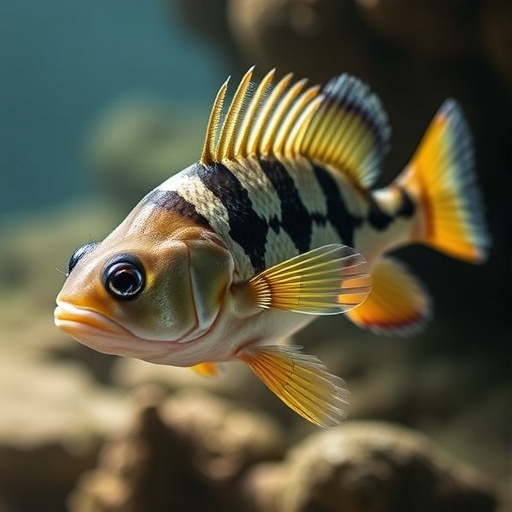In a groundbreaking study poised to make waves in the field of marine genetics, researchers from Spain have unveiled the intricate interplay of transcriptomic and DNA methylation responses to triploidy in European sea bass embryos and larvae. This important work offers profound insights into how these fish, a crucial species in aquaculture, can adapt to the added complexity of having three sets of chromosomes—triploidy—stemming from hybridization or environmental pressures. The findings of the study hold promising implications not only for the field of genomics but also for the broader aquaculture industry, making it a topic of great interest.
Triploidy in fish species, including the European sea bass (Dicentrarchus labrax), is often induced to enhance growth and yield. However, understanding the molecular mechanisms that underlie this phenomenon is paramount. The researchers focused on uncovering stage-specific changes in gene expression and epigenetic modifications due to triploidy during critical developmental phases. The ability to decipher these changes allows scientists to grasp how aquatic organisms may cope with environmental stressors and evolutionary pressures. These insights pave the way for innovative breeding strategies and improved aquaculture practices.
The study utilized cutting-edge transcriptomic sequencing techniques supplemented by comprehensive DNA methylation analyses to elucidate the effects of triploidy. By examining embryonic and larval stages, the researchers aimed to characterize the dynamic physiological responses to added genomic content. The choice of the European sea bass as the model organism underscores its importance in both ecological systems and commercial fisheries, thus making the study’s outcomes potentially applicable across various contexts within marine biology.
As sea bass undergo development, certain genes become upregulated or downregulated based on the availability of genetic material. This regulation is pivotal in guiding processes such as cell division, growth, and responses to stress, which are often altered in triploid individuals. The study’s outcome showcases distinct transcriptional signatures that emerge during key developmental stages, revealing that the triploid condition does not uniformly affect gene expression across different stages of life.
Additionally, the researchers discovered that DNA methylation—an epigenetic mechanism that modulates gene expression without altering the underlying DNA sequence—plays a crucial role in regulating this process. DNA methylation patterns influenced by triploidy indicate that the condition does not merely impact gene quantity but also quality, thereby affecting how different genes are expressed at various life stages. This information underscores the significance of epigenetic factors in understanding the complexities of fish development.
The implications of this research are far-reaching, particularly as the aquaculture sector strives to meet global seafood demands sustainably. Improving the understanding of triploidy’s genetic and epigenetic consequences provides foundational knowledge that can lead to the optimization of breeding programs, enhancing the health and survivability of aquaculture species. Such advancements could contribute to more resilient fish stocks that can better withstand the challenges posed by climate change, overfishing, and habitat degradation.
Moreover, the study sheds light on the potential applications of biotechnological interventions in fish breeding. By manipulating epigenetic states or gene expression pathways, researchers might enhance desirable traits, such as growth rates or disease resistance, leading to more efficient aquaculture practices. The integration of genomic insights with practical breeding strategies opens up a new realm for fish farmers, who can leverage these findings to feed an ever-growing global population sustainably.
While the repercussions of this study are vast, they also echo the urgent need for more research into the long-term effects of triploidy on marine ecosystems. Understanding how genetic complexity influences not only individual species but also community dynamics is essential for conservation efforts. As triploidy continues to be a focus in aquaculture, the potential ecological ramifications of releasing triploid organisms into natural habitats must be critically assessed.
The research team is hopeful that the findings will inspire further studies in other fish species and even broader aquatic organisms. By applying similar methodologies to different species, researchers can compare the effects of triploidy across the animal kingdom. Such comparative analyses will deepen our understanding of adaptation mechanisms in vertebrates and may even extend to non-aquatic animals.
As the scientific community continues to unravel the genetic intricacies associated with various life forms, the study of triploidy in the European sea bass represents a significant leap forward. It exemplifies how modern genomic techniques can illuminate our understanding of marine biology while simultaneously addressing pressing concerns related to sustainable food production.
In conclusion, this pioneering research offers valuable insights into the epigenetic and transcriptomic responses of European sea bass to triploidy, marking a significant contribution to both science and aquaculture. With a growing number of studies focusing on the genetic underpinnings of organisms, the potential benefits of this line of inquiry extend beyond the laboratory and into the real world, fostering a future where marine resources can be exploited sustainably.
By shining a light on the molecular dynamics at play in triploid European sea bass, the researchers set the stage for future explorations that may revolutionize aquaculture and deepen our conservation strategies. The detailed understanding of genetic and epigenetic factors this research provides will help address the myriad challenges that lie ahead in marine resource management, ultimately fostering a healthier planet and a more sustainable future.
Subject of Research: Triploidy and its effects on transcriptomic and DNA methylation responses in European sea bass.
Article Title: Stage-specific transcriptomic and DNA methylation responses to triploidy in European sea bass embryos and larvae.
Article References:
Beato, S., Sánchez-Baizán, N., Felip, A. et al. Stage-specific transcriptomic and DNA methylation responses to triploidy in European sea bass embryos and larvae.
BMC Genomics 26, 1004 (2025). https://doi.org/10.1186/s12864-025-12220-6
Image Credits: AI Generated
DOI: https://doi.org/10.1186/s12864-025-12220-6
Keywords: Triploidy, DNA methylation, transcriptomics, European sea bass, aquaculture, genomics.
Tags: aquaculture industry insightsdevelopmental phase gene expressionDNA methylation in aquacultureenvironmental stressors in marine speciesepigenetic modifications in embryosEuropean sea bass developmentgrowth enhancement in triploid fishhybridization and fish geneticsinnovative breeding strategies in aquaculturemarine genetics researchtranscriptomic analysis in fishtriploidy effects on sea bass





